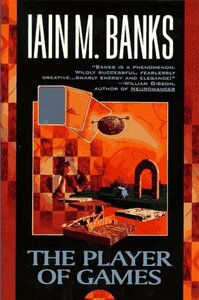Take a photo of a barcode or cover
Wait, it’s all politics and philosophy?
Always has been. To the “library drone” Flere-Imsaho, I know you wouldn’t lie to me!
Always has been. To the “library drone” Flere-Imsaho, I know you wouldn’t lie to me!
This was excellent, it's all about games so it was right up my ally and also filled with some interesting politics of an alien society.
This was a fun book! The perspective of the narrator was a little grating and Gurgeh is not always consistent in his actions, which ruins the illusion a little bit. Still, a fascinating second entry into the Culture Series with just enough tidbits about the universe to keep me interested!
medium-paced
Plot or Character Driven:
A mix
Strong character development:
Complicated
Loveable characters:
Yes
Diverse cast of characters:
Yes
Flaws of characters a main focus:
No
adventurous
challenging
medium-paced
Plot or Character Driven:
Plot
Strong character development:
Yes
Loveable characters:
Complicated
Diverse cast of characters:
Complicated
Flaws of characters a main focus:
Yes
adventurous
challenging
dark
tense
slow-paced
Plot or Character Driven:
A mix
Strong character development:
Complicated
Loveable characters:
Complicated
Diverse cast of characters:
Yes
Flaws of characters a main focus:
No
The first book in the culture series, Consider Phlebas, was pretty enjoyable and a fun introduction to the series' universe. This book takes that foundation and improves on it in almost every way I can think of.
The main character, Gurgeh, is a genius game player living in a utopian society that solved the problems of sexism, racism, and nearly all other forms of exploitation literal millennia ago. Even so, he's grown bored and disaffected, and is given a chance to play an exciting new game in a far-away empire that has not made the same progress.
Like the first book, Player of Games is definitely going for action and excitement, and is hardly subtle about its themes. That said, it manages to raise all sorts of interesting questions that I think it handles with a lot of grace. It's honestly kind of amazing to me that it was published in the 80s. The way it discusses concepts of race, gender, and social dynamics, it feels like it could have been written in the last few years.
The main character, Gurgeh, is a genius game player living in a utopian society that solved the problems of sexism, racism, and nearly all other forms of exploitation literal millennia ago. Even so, he's grown bored and disaffected, and is given a chance to play an exciting new game in a far-away empire that has not made the same progress.
Like the first book, Player of Games is definitely going for action and excitement, and is hardly subtle about its themes. That said, it manages to raise all sorts of interesting questions that I think it handles with a lot of grace. It's honestly kind of amazing to me that it was published in the 80s. The way it discusses concepts of race, gender, and social dynamics, it feels like it could have been written in the last few years.
adventurous
dark
reflective
tense
medium-paced
Plot or Character Driven:
A mix
Strong character development:
Yes
Loveable characters:
Complicated
Diverse cast of characters:
Yes
Flaws of characters a main focus:
Yes
decent, got better at the end. Didn't really resonate with me.
This book was way beyond expectations based on completing the first volume of the series, Consider Phlebas. There was a lot of background which the first volume had provided about the Culture within a conflict setting. However, this book presented a view of the Culture from the viewpoint of Gergeh, who is likely the most competent gamesman in all of the Culture. He travels to another world, Empire of Azad to play in a tournament. A lot is learned about the Culture through contrasts that Gergeh sees between the worlds and how the games are played. There is a lot of politics going on, only some of which Gergeh notices. It has a satisfying conclusion and does raise questions about the Culture as a utopian world. The book could probably be read before Consider Phlebas and it has a smoother narration and allows deeper understanding of the characters. I am encouraged to continue to read the series.


